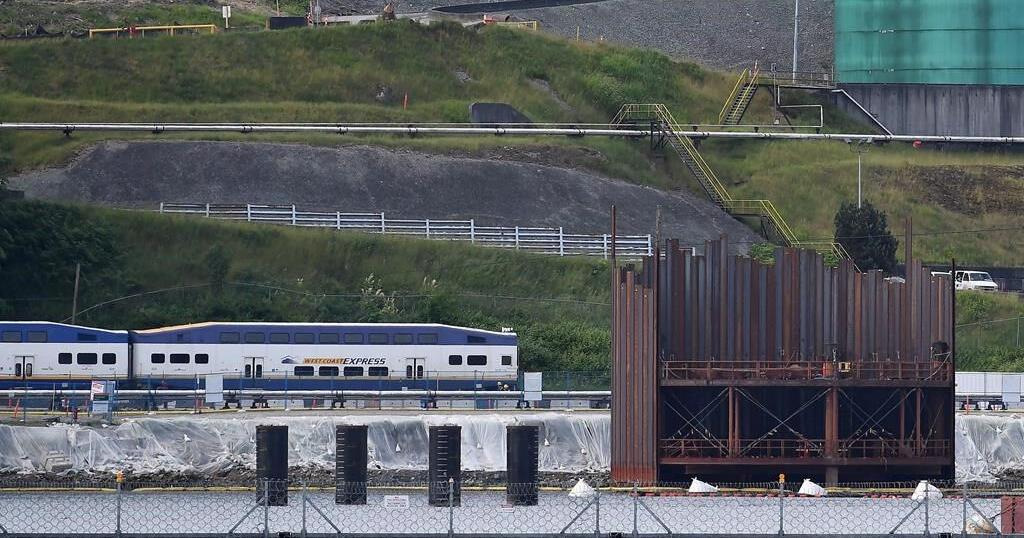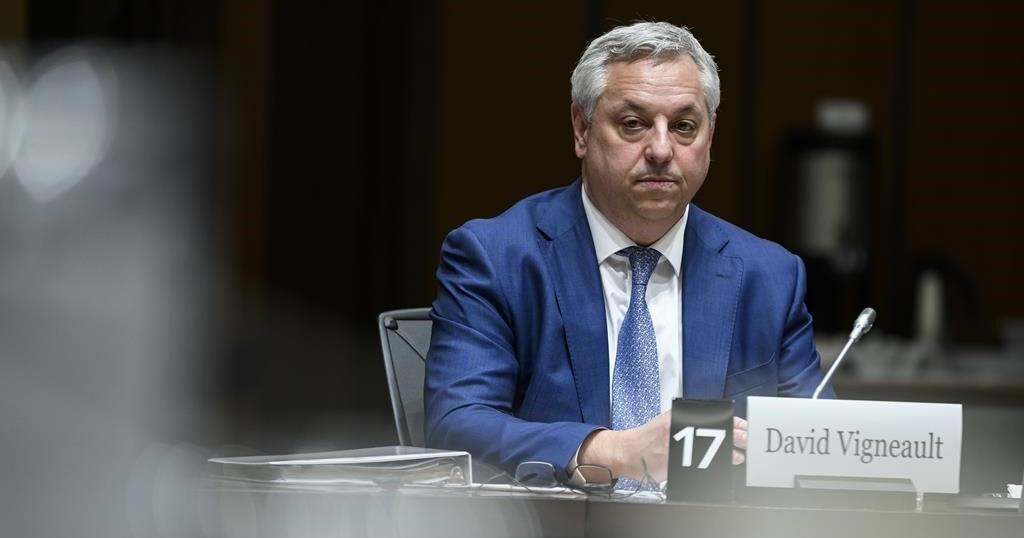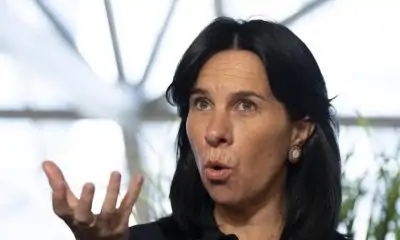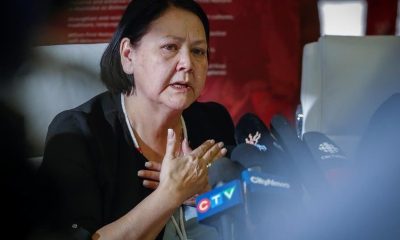VANCOUVER – When Canada’s spy chief wrote a secret letter to the public safety minister last December — the week after a report emerged that two young women in the service had been sexually assaulted by a senior colleague — it came with a warning.
David Vigneault, then director of the Canadian Security Intelligence Service, told Dominic LeBlanc that he expected “more cases to surface in the coming weeks,” and that he had to be “transparent” about this with the minister
“(We) will continue to make the difficult decisions required to make a safe workplace,” he wrote, saying that the report by The Canadian Press had left staff “reeling.”
Vigneault, who stepped down in July, had reason to be concerned.
In the days after the report was published, Vigneault’s staff compiled tables for him showing there had been 49 alleged “occurrences” of workplace harassment and violence at CSIS since 2021.
Only eight of these were deemed to have been “founded.”
The Dec. 9 letter to LeBlanc, stamped “secret,” and the tables in a Dec. 4 email were among documents provided to The Canadian Press in response to an access-to-information request.
The documents show how Vigneault and his staff responded to The Canadian Press report published on Nov. 30, in which CSIS officers made allegations of rape, bullying and harassment in the service’s B.C. physical surveillance office.
The statistics about workplace sexual harassment and violence were compiled as part of Vigneault’s preparations for an all-staff town hall meeting about the allegations on Dec. 5.
The tables and an explanation provided by CSIS show that 20 of the 49 “occurrences” since 2021/2022 were ongoing cases. Of the 29 that were “resolved,” three were withdrawn, while two ended in conciliation, six through an investigation and none through negotiation.
Eighteen, meanwhile, were resolved through the implementation of recommendations reviewed by an occupational health and safety committee.
The numbers were not announced to the 3,000-plus staff who attended the town hall meeting in person and virtually.
But in May, CSIS released an annual public report that said there were 24 ongoing harassment investigations in 2023, depicting this as a sign of success.
“(A)lthough some would use this metric to criticize CSIS, we believe it is indicative of the advancements we have made to improve our workplace culture, as more employees are now placing their faith and confidence in CSIS’ internal grievance process,” wrote Renée de Bellefeuille, the service’s chief human resources officer.
That report did not describe how frequently cases were resolved to the satisfaction of complainants.
CSIS spokesperson Eric Balsam said in an emailed statement that some complaints took longer than normal to complete.
“On occasion, a notice of occurrence may take longer to resolve given other mitigating circumstances that may have an impact on the process,” Balsam said. “For example, the temporary absence of either party, or availability of investigators.”
Several employees were suspended between 2020 and 2024 and two were terminated, but Balsam said CSIS is “not in a position to reveal the nature of the conduct for which the employees were suspended and/or terminated because providing details for such a small number of files could breach privacy obligations.”
Balsam added that the service has “seen a higher number of grievances, complaints and conduct cases since the beginning of 2024.”
The tables list four occurrences as sexual harassment and violence and 45 cases as non-sexual.
In the December town hall meeting, Vigneault told staff the senior officer accused of rape had left the service the day before.
The man’s accusers have said he abused them in CSIS vehicles while on covert missions, in one case losing sight of a surveillance target because he allegedly drove to a car park to rape his CSIS partner.
The officers said they could not go to police because they feared breaching the CSIS Act by identifying themselves and their alleged attacker as covert officers, an offence with a penalty of up to five years in prison.
Vigneault’s letter to LeBlanc says he told staff there existed an “authority and process to report a crime to the police.”
A former CSIS employee who worked in a supervisory capacity in Ontario said her harassment complaint against a high-level managerwas among those that remain outstanding.
She said she also filed a complaint on behalf of another employee as a witness but has not been contacted in the two years since it was submitted to CSIS.
The former supervisor, who spoke on the condition of anonymity because of the CSIS Act’s prohibition against identification, has since left the agency.
She said in an interview that the behaviour of the new senior manager prompted the group to “come to me with concerns.”
“Then people started coming with more formalized complaints,” she said. “I had to tell people that either you have to report something or I have to report something.”
She said the manager was “highly problematic,” gossiping about employees, revealing highly personal information and “maligning” peoples’ character behind their backs.
The former supervisor said she knew formalizing complaints against someone well-connected in the service would be like signing her own “career death warrant.”
“I’m in a position where I have to say something and in saying something, I’m probably not going to be believed,” she said. “No one was going to want to touch me after that.”
She said that since filing the complaint in 2022, she had left the service for an unrelated job.
“It was making me sick,” she said. “I couldn’t bear the weight of it anymore and I thought I had nowhere else to go.”
She said she believed the complaint process had “utterly stalled,” and she had not received updates as required. This could be due to the “slow machinery of government,” she said.
‘PROBLEMATIC BEHAVIOUR’ IN CSIS OFFICE
The documents obtained by The Canadian Press also show how CSIS responded to the turmoil in the B.C. surveillance office.
In addition to the two officers who said they were sexually assaulted, two other officers supported their claims and said bullying and harassment were rife in the office.
The documents show the service commissioned a “workplace climate assessment” for the office last year. A Nov. 22 letter from B.C.’s assistant director general — whose name is redacted — says the assessment followed allegations of “problematic behaviour with respect to inappropriate conduct, harassment, leadership issues etc., that has resulted in a perceived toxic work environment.”
But the assessment did not look at the complaints of sexual assault and other wrongdoing made by the two women officers against their senior colleague, who was decades older than them, the documents show.
The assessment’s terms of reference say the process focused instead on the “current work environment,” and it would “not consider information from employees that was previously provided under a separate formal process.”
A redacted copy of the assessment dated Jan. 22 said staff indicated “a workplace culture that is perceived as fairly positive (with some definite exceptions).”
The unit’s “main shortcomings” involved the handling of complaints, “especially those related to inappropriate conduct like disrespect, bullying, harassment etc.”
“There is a general sense that accountability is significantly lacking and that the enforcement of policies and procedures is often weak,” the assessors wrote.
The assessment found the unit was understaffed and there had been “a relatively high turnover recently, especially with respect to female members leaving the unit,” causing a “distinct gender imbalance.”
It said the workplace was “male dominated” and there was an “intergenerational divide” between staff.
However, the assessment said staff “strongly disagreed” the workplace was “toxic,” but there was a “perceived lack of leadership” which contributed to “highly ineffective conflict and complaint handling approaches.”
The two B.C. officers who said they were sexually assaulted lodged anonymous lawsuits in B.C. Supreme Court.
One was dismissed last September on technical grounds that the officer had not exhausted the internal CSIS complaints process, which was “ongoing.” She said this week that she had “never been told (by CSIS) that it was still an ongoing investigation at any point.”
The officer said previously that a report for CSIS with a protected security classification had concluded her rape complaint was unfounded on the balance of probabilities.
The court file for the other officer has been inactive since it was filed in June 2023, with no public response filed by CSIS. Her accusations were investigated by CSIS as part of the other woman’s complaint.
Matt Malone, an assistant law professor at Thompson Rivers University who specializes in workplace investigations, reviewed the workplace assessment, and said its language suggested “system-wide problems with leadership” in the unit.
“This is very much a situation of where there’s smoke, there’s fire,” he said. “This workplace assessment is indicative of deeper rooted problems in the service, and you can see that there is an admission that most parties disagreed with the characterization of ‘toxic work environment,’ but there’s very uniform and very consistent discussion around the shortcomings of leadership.”
Vigneault announced on July 4 that he was retiring from the service after seven years at the helm.
The former Ontario CSIS supervisor said she lodged her complaint in 2022 out of a “strong sense of duty and responsibility,” hoping to trigger not only a change in the individual, but also “bigger change within the organization around leadership.”
Almost two years later, she said she had little faith such top-down change would happen.
“You can barely remember what you had for breakfast yesterday. Who’s going to remember what was said or not said in a meeting once upon a time?” she said.
“Investigations are still ongoing, but when you have five or six complaints filed against one manager all in under a year and you continue to promote that person and give them incredible, incredible career opportunities, I don’t actually think the organization has been ready to accept responsibility.”
“The leadership were born and raised in that same organization. They don’t know anything different,” she added. “How do you change that? I don’t know.”
This report by The Canadian Press was first published Sept. 12, 2024.

























